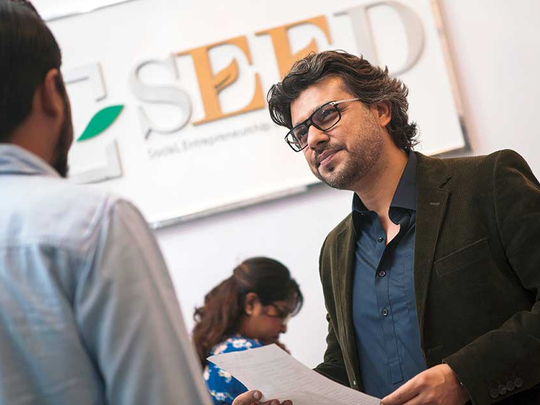
Karachi: After banks in Pakistan turned down loan applications for his fledgling advertising company seven years ago, Faraz Khan found plenty of private investors willing to back his vision — with a catch.
A lot of the cash was illicit and accepting it would have turned his Gizelle Communication Ltd into a money launderer.
“There were investors with blank checks and investors who were like ‘take as much money as you want’,” he said over coffee at the Movenpick Hotel in Karachi. “You have to sift through very carefully the ones that are dirty money.”
Khan instead turned to other businesses and an international bank to build the company, which he is considering listing on the Pakistan Stock Exchange this year in what would be a first for a start-up in the country. Stung by the reluctance of banks, he’s taking on more of an angel investor role to get hundreds of other businesses off the ground across Pakistan as the 42-year-old seeks to replicate his success with Gizelle through his Seed Ventures incubator.
It’s not an easy task.
While larger neighbour India has long had a vibrant venture capital and start-up scene, that’s not the case in Pakistan. It’s South Asia’s second-largest economy and home to about 200 million, yet the country is looked at with caution by foreign investors given power shortages and security concerns. Most of the country’s commercial banks are risk averse, making money through investments in government notes and bonds and preferring loans to traditional manufacturers and industries run by well established families.
Government loan programme
With unemployment remaining high, even as China finances more than $55 billion (Dh202 billion) of infrastructure and energy projects, the country is struggling to create enough jobs for its young workforce.
In an attempt to boost entrepreneurship, Prime Minister Nawaz Sharif set up a loan program for those under the age of 45 to set up businesses, providing interest free loans to more than 260,000 people since his election in 2013. That’s critical in a country where nearly two-thirds of the population is under 30, according to the Jinnah Institute, an Islamabad-based think tank.
Leila Khan, a lawmaker and chairwoman of the youth loan program, along with other officials at the agency, didn’t respond to requests for comment.
Home grown organisations like Seed Ventures and Planet N Pvt are attempting to change the status quo. Young Pakistanis that Khan meets at university roadshows are often resistant to becoming entrepreneurs.
They say “it’s risky, there’s a chance of failure, there’s a lack of access to finance and we’ve got great expectations from our parents to actually become doctors, engineers, lawyers and that is a safer option,” Khan said, whose firm, Seed Ventures, has invested 78 million rupees ($745,000), supporting 135 start-ups. “That’s the cultural mindset.”
According to Planet N, of the more than 700 start-ups that were established since 2010, 67 per cent are still active and 68 have managed to raise funding of about $20 million. At least 24 incubators, accelerators and co-working spaces supporting start-ups have popped up across the country in the past seven years.
Failure rate
Despite the growth of incubators and accelerators, start-ups will continue to stumble without wider access to seed finance, said Nadeem Hussain, the founder of Planet N. While his firm has invested $8 million in 41 companies, most of them start-ups, he estimates that at least $1 billion of seed money is needed in Pakistan to help new businesses take the next step.
“They teach you, they mentor you, but when you come out there’s no capital,” said the 61-year-old Hussain, a financier who built Tameer Microfinance Bank Ltd before selling it to Telenor ASA last year. “Unless we can address that, people are going to turn away from entrepreneurship because of the high failure rate.”
The old way of thinking is being challenged at centres that are popping up across Pakistan. The Nest i/o, which opened in Karachi about two and a half years ago, looks just like the incubators found in Silicon Valley. In a high-rise with views across the city of 20 million, millennials hunch over laptops in a colourful open-plan office littered with foosball tables and beanbags.
Founder, Jehan Ara, took inspiration from visits to incubation centres in Germany, the UK and the US. Gaining about $1.4 million in grants from Alphabet Inc’s Google, Samsung Electronics Co. and the US. State Department, about 100 start-ups have come through the centre’s four-month cycle. About 85 per cent of those are continuing to survive.
Young people
Among the businesses that have been through The Nest are a provider of flat-pack homes for refugee camps and one that makes engraving machines that are a fraction of the price of imported ones, said Ara. Social Champ, a mobile app which simultaneously posts on different social media platforms, caught the eye of venture capitalist Guy Kawasaki, who has invited the founder to Silicon Valley, she said.
“A lot of kids have started thinking start-ups, which is a good thing,” Ara, who calls herself the Nest’s “Big Bird,” said in her office decorated with soft toys, candy and entrepreneurial and motivational text books. “It’s a shift, it started three to four years ago when kids started taking work online.”
Google has just renewed Nest’s grant for another three years and is now looking to open an accelerator program and enter the race with Seed Ventures and Planet N for Pakistan’s first unicorn, a start-up with a value of more than $1 billion.
To get there, more will have to be done.
“It’s sad if I’m the largest angel investor in Pakistan because I know groups sitting with half a billion dollars of liquidity which aren’t coming in this space,” said Planet N’s Hussain.












